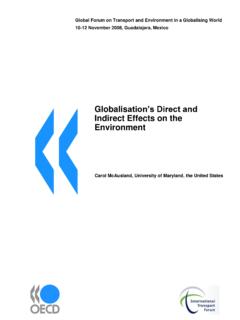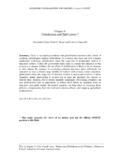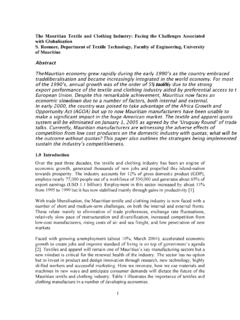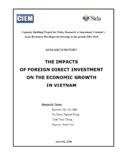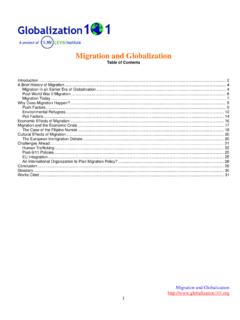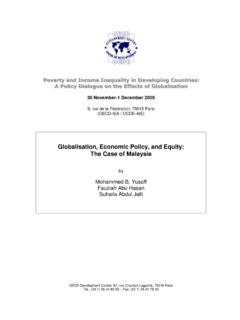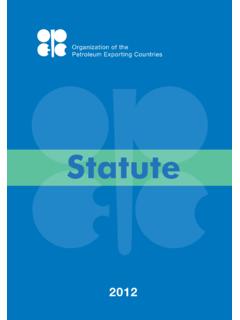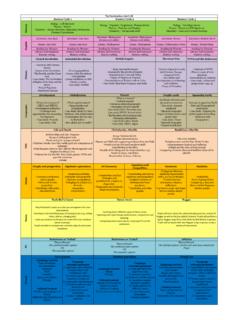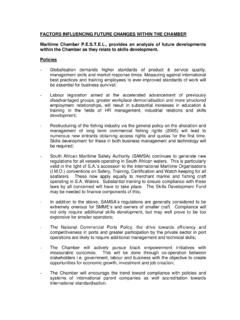Transcription of Globalisation: Definitions and Perspectives (Composed by ...
1 globalisation : Definitions and Perspectives (Composed by Eric Beerkens, 2006) globalization refers to all those processes by which the peoples of the world are incorporated into a single world society, global society ( ). Albrow 1990 Globality is supplanting modernity (p. 4) Albrow 1996 The world economy has become so highly interdependent as to make national independence an anachronism, especially in financial markets. The interdependence is driven by science, technology and economics - the forces of modernity.; and these forces, not governments, determined international relations. Thanks to this interdependence, war between modern nations is an impossibility. Angell 1911 The critical point is that both sides of the coin of global cultural process today are products of the infinitely varied mutual contest of sameness and difference on a stage characterised by radical disjunctures between different sorts of global flows and the uncertain landscapes created in and through these disjunctures.
2 (p. 17) Appadurai 1990 What is taking place is a process of cultural mixing or hybridization across locations and identities Appadurai 1996 The emergent global order is locked in a major conflict between the consumerist 'McWorld' on the one hand and the identity politics of the 'Jihad' on the other. Barber 1996 Within the paradigm of the second modernity, however, globalization not only alters the interconnectedness of nation-states and national societies but the internal quality of the social. Whatever constitutes society' and politics' becomes in itself questionable, because the principles of territoriality, collectivity and frontier are becoming questioned. More precisely: the assumed congruence of state and society is broken down and suspended: economic and social ways of acting, working and living no longer take place within the container of the state.
3 Beck 2000 globalization however the word is understood implies the weakening of state sovereignty and state structures. ( ) Beck 2000 The world-wide interconnectedness between nation-states becomes supplemented by globalisation as a process in which basic social arrangements (like power, culture, markets, politics, rights, values, norms, ideology, identity, citizenship, solidarity) become disembedded from their spatial context (mainly the nation-state) due to the acceleration, massification, flexibilisation, diffusion and expansion of transnational flows of people, products, finance, images and information ( ). 2004 Beerkens What distinguishes the different views is the point of reference used. After all, if we regard globalisation as a process, there must be a past reality' that is or has been affected by this process.
4 Classified according to the point of reference taken we can approach global' as a geographical concept, distinguishing it from the local; as a concept of authority and power, distinguishing it from territorial sovereignty; as a cultural concept, distinguishing it from isolation; and finally, as an institutional concept, distinguishing it from national ( ). Beerkens 2004 What is new is not so much that international trade is an important part of each nation's Carnoy globalisation may indeed mean the end of the nation-state if the nation-state fails to redefine itself to meet the new conditions it faces in the global environment. Carnoy 2001 The global economy is an economy with the capacity to work as a unit in real time on a planetary scale ( ) Castells 1996 The network society is, in its various institutional expressions, is (.)
5 A capitalist society. But this brand of capitalism is profoundly different from its historical predecessors. It has two distinctive features: it is global and it is structured, to a large extent, around a network of financial flows. Castells 1996 embracing in this exclusion most, or all, of their populations. This is different from the traditional process of spatial segragation. Castells 1998 The state as a competition state' plays a fundamental role in promoting globalization . However, this does not mean that, once the genie is out of the bottle, globalization is reversible. Cerny 1999 At the end of the twentieth century, the analysis of globalization of capital must start with finance. The financial sphere is the one in which the internationalization of markets is most advanced; the one in which the operations of capital have reached the highest degree of mobility.
6 Chesnais 1997 The happy ending of the globalisation narrative is one in which both nations and companies become faster and more agile in developing respomnses to new forms of competition. In relation to the public sector, this narrative of globalisation as a double purchase. Not only must states enable business to become more competitive (by reducing the iron hand of regulations and excessive taxation), it must also become more lean and agile itself. Both imply a reduction in the size and cost of the public sector and 'being business-like is presented as the means of achieving these objectives. Clarke & Newman 1997 economy, but that a national economy works as a unitat the world level on real time. This gives a tremendous advantage to multinational firms, since they already have the knowledge required to produce and to market goods and services internationally.
7 Nation-states remain important in organizing activities, yet their frame of reference for economic strategies can no longer be restricted to the national economy (p. 212). 1995 The rise of [global] informationalism in this end of millenium is intertwined with rising inequality and social exclusion throughout the world.(..) Moreover, the process of social exclusion in the network society concerns both people and territories. So that, under certain conditions, entire countries, regions, cities and neighbourhoods become excluded, The characteristics of the globalization trend include the internationalizing of production, the new international division of labor, new migratory movements from South to North, the new competitive environment that generates these processes, and the internationalizing of the state.
8 Making states into agencies of the globalizing world. Cox 1994 globalisation can be defined as a material set of practises drawn from the world of business combined with a neo-liberal market ideology Curry & Newson 1998 Internationalization processes involve the simple extension of economic activities across national boundaries. It is essentially a quamtitative process which leads to a more extensive geographical pattern of economic activity. globalization processes are qualitatively different from internationalisation processes. They involve not merely the geographical extension of economic activity across national boundaries but also -and more importantly - the functional integration of such internationally dispersed activities. Dicken 1998 Because the discourse of enterprise presupposes that no organisational context is immune for the effects of globalisation , it therefore assumes that ostensibly different organisations schools, charities, banks, government departments and so on -will have to adopt similar norms and techniques of conduct for without so doing they will lack the capacity to pursue their preferred The urgency with which such claims are deployed gives the impression that "There is no alternative".
9 (p. 137) du Gay 1994 The process of globalization suggests simultaneously two images. The first image entails the extention outwards of a particular culture to its limit, the globe. Heterogeneous cultures become incorporated and integrated into a dominant culture which eventually covers the whole world. The second image points to the compression of cultures. Things formerly held apart are now brought into contact and juxtaposition. Featherstone 1995 If the defining perspective of the Cold War world was "division," the defining perspective of globalization is "integration." The symbol of the Cold War system was a wall, which divided everyone. The symbol of the globalization system is a World Wide Web, which unites everyone. The defining document of the Cold War system was "The Treaty.
10 " The defining document of the globalization system is "The Deal." Friedman 1999 Business is going to change more in the next ten years then in the last fifty. These changes will occur because of a disarmingly simple idea: the flow of digital information. Gates 1999 The process of globalization was not just an acceleration along a continuum of European expansion but a new ordering of relations of domination and subordination among all regions of the world. Geyer and Bright 1995 One can not conclude that if globalization has not occurred then it is not a process. It may simply be that globalization is proceeding in a very uneven fashion and that trends which can be readily discerned in financial systems and to some extent in research and Gibbons 1998 development, particularly in the electronics industry, ought not to be presumed to apply to the same degree in every sector.
